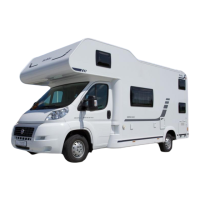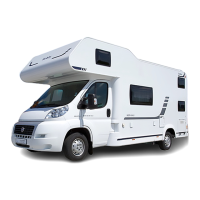Do you have a question about the Hobby 720 UML Prestige and is the answer not in the manual?
Provides information about the camper's continuous development and HOBBY's right to make changes.
Advises familiarizing with the handbook and filling out guarantee cards for appliances.
Details HOBBY's 5-year guarantee on camper watertightness and annual leak checks.
Explains how texts and illustrations are presented and details marked with position numbers.
Highlights important details for trouble-free operation and points out dangers.
Shows ways to reduce strain on the environment.
Lists keys provided and explains warnings and information labels.
Lists essential rescue items and provides fire prevention measures.
Details steps for preparing the exterior of the camper before driving.
Lists actions for securing loose objects, checking fluids, and closing compartments.
Provides guidelines for distributing weight evenly and securing heavy objects.
Explains that gross vehicle weight and drawbar load must not be exceeded.
Illustrates and describes different stowage areas for light, medium, and heavy objects.
Gives step-by-step instructions for determining and adjusting the drawbar load.
Provides crucial rules for driving, including speed adjustment and handling side winds.
Offers advice on safely navigating curves with a camper.
Explains how trailer brakes differ from car brakes and the need for testing.
Offers rules for selecting a suitable and level parking spot.
Details how to secure the camper after parking, including handbrake and stop-blocks.
States that undercarriage modifications are not allowed and maintenance is crucial.
Discusses chassis beam connections, maintenance, and restrictions on modifications.
Explains preparation for fitting a special Truma mover, including mounting holes and stabilization.
Describes the safety coupling with tracking stabilizer and its compliance with ISO 11555-1.
Explains how to prepare for, perform, and inspect hitching and unhitching.
Explains how to activate, shut off, and control the stabilization system.
Instructions for raising and securing the front landing wheel before driving.
Steps to lower the front landing wheel to the ground.
Explains how to activate the locking brake when parking the camper.
Describes the rapid-emergency brake function combined with the hand brake.
Provides checks for the towbar's movement and reaction point.
Explains drum brakes, their automatic reverse, and maintenance requirements.
Explains the location and operation of rotating stanchions for support.
Mandates regular brake pad adjustment by a specialist after initial km and annually.
Lists required documents for camper registration and the '100' speed sticker.
Details the mandatory biennial inspection and required documents.
Explains where to find the VIN and its importance.
States the camper is equipped for 100 km/h and outlines conditions for maintaining this speed.
Lists vehicle requirements, such as ABS and weight limits, to legally drive at 100 km/h.
Explains EG regulation 97/27/EG for calculating masses and loading.
Defines g.v.w.r. as indicated from the factory, which must not be exceeded.
Defines mass in running order including standard and basic equipment.
Details weights of basic equipment, including liquid gas, fluids, and electric supply.
Calculates additional load as the difference between g.v.w.r. and mass in running order.
Advises using designated tires and checking tread depth and damages.
Explains tire size entry in registration and provides rules for checking tire pressure.
Illustrates correct, low, and high tire pressure conditions.
Recommends changing tires after six years and avoiding obstacles.
Explains tire aging and how to check the DOT number for manufacture date.
Lists rules for using other rims, including size, capacity, and screw mechanisms.
Advises checking wheel bolts and specifies adjusting torque for different rim types.
Details pre-change steps for the vehicle and camper, including securing.
Instructions on placing wheel chocks and loosening screws before jacking.
Lists warnings about jack usage, frame parts, and rotating stanchions.
Step-by-step guide for changing a tire, including jack placement and screw tightening.
Explains how to use the tire repair kit and its limitations.
Detailed steps for using the tire repair kit, including shaking, filling, and checking pressure.
Explains the importance of ventilation for comfort and preventing corrosion.
Describes ventilation bars for the refrigerator and potential suffocation danger.
Step-by-step instructions for removing ventilation grids.
Explains the ventilation flap for the heating element and the flue's location.
Instructions for opening and closing the external entry door.
Warns against using insect screen for entry and blocking the escape route.
Instructions for opening and closing the internal entry door.
Explains how to open and close the upper and lower parts of the stable entry door.
Detailed steps for unlocking and securing the upper part of the stable entry door.
Instructions for reconnecting and locking the upper and lower parts of the stable door.
Advice on positioning and using the entry step tread for safe entry/exit.
Instructions for opening/closing service flap and associated warnings.
Instructions for opening and closing the gas-bottle container flap.
Instructions for opening and closing the toilet flap.
Details rules for using ladders, placing covers, and maximum roof load.
Explains how the outer tent slides into guide rails and the purpose of the seal.
Describes using the Hobby Vario Clip for attaching an outer tent.
States the carrier load limit and advises on handling with a loaded carrier.
Covers operation of kitchen wall cabinets, magnetic catches, and washroom doors.
Instructions for opening and closing kitchen wall cabinets.
Instructions for opening and closing furniture doors with magnetic catches.
Instructions for opening and closing furniture doors with handles.
Instructions for opening and closing wardrobe doors with knobs.
Instructions for operating kitchen drawers with push-lock mechanisms.
Explains different locking mechanisms for kitchen drawers (Version A & B).
Details the lock mechanism for the cutlery drawer and wire basket drawers.
Describes the pivoting TV cabinet (media oval) and its functions.
Instructions for opening and operating storage shelves in a corner kitchen.
Details the extendable, pivot-mounted media shelf and its features.
Instructions for unlocking, folding, and securing the optional TV mount.
Instructions for lowering and turning the elevating table.
Instructions for lowering a hanging table.
Instructions for lowering and turning a swivelling table.
Step-by-step guide to convert seating into a bed.
Details bed expansion for side seating and long beds.
Warns about accidental opening and the load limit for bunk beds.
Instructions for opening and closing hinged windows.
Instructions for operating blackout pleating, shades, and insect screens.
Instructions for operating the roof fan.
Explains how the shade and insect screen operate together.
Provides safety rules for opening roof bonnets in various conditions.
Instructions for opening and closing the large roof bonnet.
Instructions for opening and closing the small roof bonnet.
General safety advice regarding electrical installations and equipment.
Overview of the standard control panel with labeled functions.
Overview of the optional LCD control panel with its functions.
Explains the operation of the main switch for activating devices and turning off lights.
Instructions for operating and dimming wall and ceiling lamps.
Instructions for switching on/off and dimming ambience lighting.
Explains how to save and recall light states using the memory key.
Instructions for switching the outer tent and kitchen lights on/off.
Instructions for operating the therme and floor heating systems.
Instructions for operating floor heating and its LED display.
Explains how to read the fresh and waste water tank levels via LEDs.
Instructions for operating lights in the washroom and by beds using remote control.
Introduces the remote control transmitter for switching functions.
Describes the appearance of the basic menu when no navigation key is pressed.
Explains how time, date, and connection status are displayed.
Describes icons for battery charging, discharging, and alarm clock status.
Explains how to display fresh water tank levels.
Describes how to display outside/inside temperatures and battery voltage.
Instructions for setting time, date, wake-up time, and alarm clock.
Information on the LCD display's button cell and replacement.
Explains the camper's 230V power supply via a CEE feeder plug.
Step-by-step guide to connect the camper to an external 230V mains supply.
Instructions for safely disconnecting from the 230V mains supply.
Details rules for using connection cables and power consumption limits.
Explains 12V operation via the base vehicle and power conservation.
Detailed diagram and table of the 13-pole plug pin assignments.
Lists rules for installing and changing auxiliary batteries, including safety precautions.
Explains how the auxiliary battery supplies power and the role of the charge controller.
Explains how the system switches between mains and battery operation.
Describes the converter's role in transforming mains voltage for 12V devices.
Clarifies which devices use 12V and which use 230V.
Lists the assignment of fuses for various internal electric circuits.
Advises replacing fuses only after fixing the cause and using correct values.
Describes the optional external socket and antenna terminal for TV setup.
Diagrams showing 12V electrical installation with wire colors and functions.
Detailed diagram and table of the 13-pole plug pin assignments.
Diagram showing the contact assignments for the light control system.
Instructions for switching corner spotlights and lighting columns.
Details operation of the children's bed light and its night light function.
Explains water system correspondence to standards and recommends inspection.
Provides notes on water quality, direct sourcing, and system draining/rinsing.
Describes water supply via pump and lists rules for its operation.
Details the fresh water tank's volume, filling method, and overflow.
Describes the portable waste water tank and its features.
Advises on storing the waste water tank in the gas-bottle container and securing it.
Step-by-step guide for filling the water system, including flushing taps.
Explains how to drain water and mix temperatures.
Detailed instructions for emptying the entire water system.
Describes the therme operation for hot water and its temperature regulation.
Advises switching off the therme when not in use.
Instructions for preparing the excrement tank before toilet use.
Steps to prepare the flushing water tank, including water level checks.
Instructions for operating the toilet, including valve operation and flushing.
Detailed instructions for emptying the excrement tank.
Covers inspection, regulator knobs, hoses, and safety requirements for gas facilities.
Details mandatory expert inspections every two years for gas facilities.
States that installations and modifications must be done by experts.
Specifies using custom-made regulator knobs with safety valves.
Specifies fixed output pressure for regulators and connection methods.
Lists pre-use checks, including ventilation, removing debris, and fire extinguisher placement.
Lists devices operated by propane gas facilities.
Provides rules for checking bottle security, leaks, and ventilation.
Step-by-step instructions for safely changing gas bottles.
Explains how to cut off gas circulation with spigots and their meanings.
Explains connecting gas devices via the socket and safety latch.
Specifies operating pressure and maximum performance for connected devices.
States that built-in devices must be repaired by specialists and use original parts.
Warns that changes or non-compliance void guarantees and operating licenses.
Specifies installation locations and details pre-use checks for the heating system.
Instructions for operating the hot-air heating system, including ignition and flame control.
Explains re-ignition procedures and safety after flame extinguishment.
Instructions for shutting off the hot-air heating system.
Guide for replacing batteries in the automatic ignitor.
Explains the recirculation air system and air vent adjustment.
Warns to always turn on the circulation fan to prevent overheating.
Instructions for manual and automatic adjustment of fan speed and heat level.
Explains operation modes (gas, electric, combined) and power settings.
Instructions for switching electric auxiliary heating on and off.
Describes the floor heating system's location and purpose (heat loss reduction).
Explains how to turn on the floor heating via the service panel.
Provides technical data and warnings for the floor heating system.
Warns against operating the hot water heater while driving.
Describes the Compact 3010 LPG heater and its separate heating capability.
Lists critical info: instructions, draining, glycol, and operation modes.
Explains the operating device display and button functions.
Instructions for starting the hot water heater using the control panel.
Instructions for shutting off the hot water heater.
Guide for adjusting temperature settings using the control buttons.
Explains how to control hot water function via the display.
Instructions for controlling heating with gas via the display.
Instructions for controlling electric heating and selecting power settings.
Warns about switching off before journeys, removing chimney cap, and frost.
Step-by-step instructions for filling the boiler.
Instructions for emptying the boiler.
Instructions for operating the boiler using gas.
Instructions for operating the boiler using electricity.
Steps for switching off the boiler after use.
Explains the three operating modes: 12V, 230V, and gas.
Details 12V operation, its limitations, and how to switch off.
Instructions for 230V operation and temperature regulation.
Instructions for gas operation, including ignition and thermostat adjustment.
Explains automatic and safety locks on refrigerator doors.
Describes locked and ventilation positions for the refrigerator door.
Describes the freezer compartment and its frame heater function.
Provides guidelines for storing food in the refrigerator and freezer.
Details pre-use checks for the gas cooker, including ventilation and flame guards.
Warns against using cookers for heating and operating with glass covering closed.
Step-by-step instructions for operating the gas cooker, including ignition and flame control.
Instructions for operating the fume hood and cleaning its filter.
Covers oven operation, ventilation, ignition, and safety precautions.
Instructions for turning the oven on and off, and positioning baking trays.
Steps for turning off the oven and closing valves.
Instructions for operating the microwave, including power and cooking time settings.
Notes on accessory instructions, modifications, and HOBBY's liability.
A table listing weights of various accessories for load calculation.
Details maintenance intervals and rules, including warranty for leaks.
Mandates biennial inspection of gas facilities by a liquid gas expert.
Provides rules for greasing and oiling undercarriage parts and movable components.
Includes greasing stationary parts, checking thrust rod, and cleaning/oiling parts.
Ensures coupling ball is clean, undamaged, and free of grease for proper function.
Instructions for cleaning friction linings and greasing movable parts.
Explains how to easily exchange worn friction pads.
Details initial and regular inspections for wheel brakes and documentation requirements.
Step-by-step guide for carefully removing protective caps, screws, and holders to access bulbs.
Explains the essential role of ventilation for climate and preventing corrosion.
Provides rules for exterior cleaning, emphasizing proper sites and gentle methods.
Notes on using high-pressure cleaners, including distance, pressure, and water temperature.
Recommends periodic waxing and using solvent-free polishes for paint surfaces.
Instructions for removing tar, resin, and organic stains using solvents.
Emphasizes immediate repair of damage and undercarriage protection.
Advises rinsing galvanized chassis with clear water after winter driving.
Recommends rubbing insulation of doors and windows with talcum.
Instructions for cleaning fabric items, recommending dry cleaning for soiled items.
Advice on cleaning carpets using vacuum cleaners, brushes, or foam.
Instructions for cleaning PVC surfaces with special solvents, avoiding carpets on wet surfaces.
Instructions for cleaning wooden furniture finishes and using mild polish.
Covers cleaning the toilet area with soap, avoiding vinegar, and lubricating seals.
Recommends using household cleaners or stainless steel cleaners for the sink.
Details cleaning the hot-air system and replacing glycol mixture in the heating system.
General rules for preparing the camper for winter, including storage and covering.
Advice on disconnecting and storing the auxiliary battery during winter.
Details cleaning behind the refrigerator and the fume hood filter.
Covers washing, checking for damage, waxing, and protecting chassis.
Instructions for cleaning, disinfecting, and emptying water pipes, tanks, and the boiler.
Recommends optimizing the camper for personal winter use and consulting the dealer.
Provides rules for heating in winter, including air intake and exhaust, and maintaining low heat.
Covers cleaning interior, storing items, leaving vents open, and using dehumidifiers.
Explains the importance of ventilation to prevent condensation damage.
Covers preparing containers, adding antifreeze, and keeping drain cocks clear.
Emphasizes environmentally sound use and responsible behavior.
Provides rules for waste water disposal, emphasizing designated sites and rinsing tanks.
Details approved cleaners for faeces tanks and disposal procedures.
Instructions for separating trash and keeping rest areas clean.
A table listing tire sizes and recommended air pressure in bar.
A table detailing weights (empty, running order, g.v.w.r., add. load) for various camper models.
A table listing weights for various camper models, including De Luxe, Excellent, and Prestige series.
Details weights of basic equipment, including liquid gas, fluids, and electric supply.
A table listing technical data like g.v.w.r., axle load, tires, brakes, and towbar for various models.
A table detailing trade names, tire sizes, fitting dimensions, and overall lengths.
A table showing possibilities for increasing loads, including axle, tire, and brake specifications.
A table listing tire sizes, pressures, and rim details for standard and light alloy options.
A table detailing vehicle exterior lighting positions, voltage, and wattage.
A list of interior lamps with their types, wattage, and voltage.
Diagram showing moulding dimensions and block sizes on the camper body.
| Brand | Hobby |
|---|---|
| Model | 720 UML Prestige |
| Category | Motorhomes |
| Language | English |











